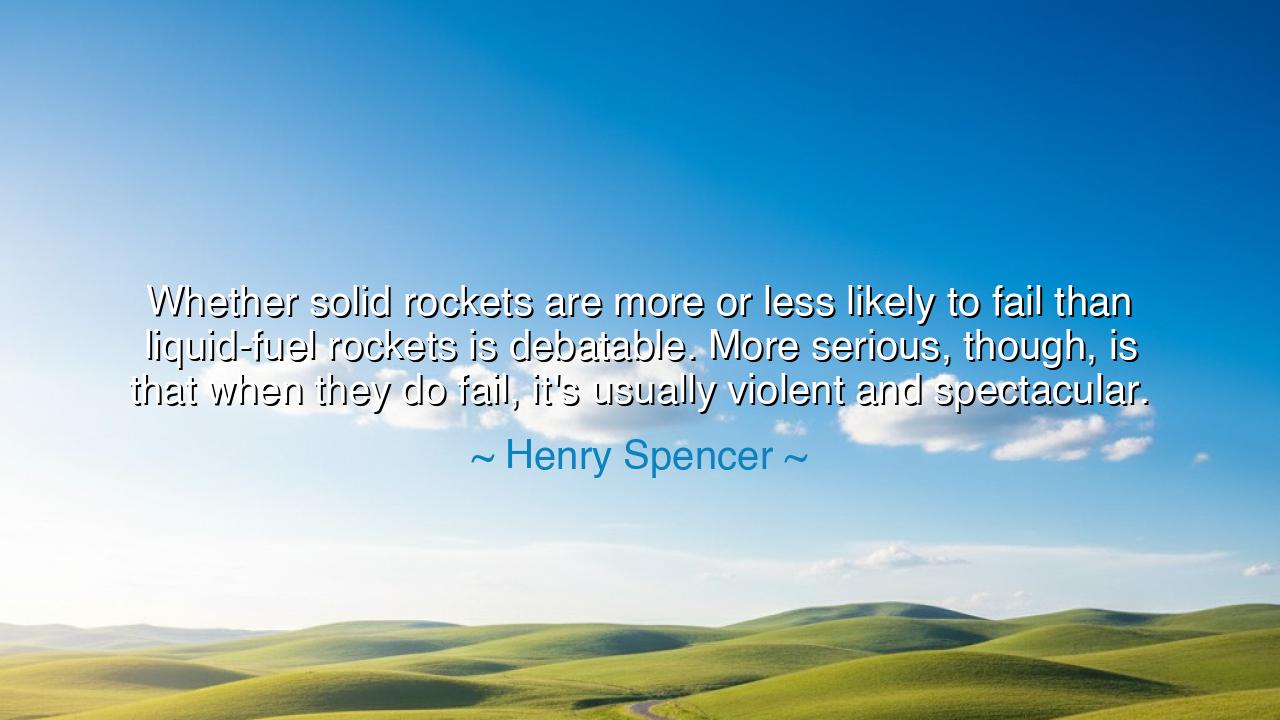
Whether solid rockets are more or less likely to fail than
Whether solid rockets are more or less likely to fail than liquid-fuel rockets is debatable. More serious, though, is that when they do fail, it's usually violent and spectacular.






O Children of the Sky, gather close and listen to the words of Henry Spencer, who, with the wisdom of the ages, spoke of a truth that is as old as the heavens themselves. He said, "Whether solid rockets are more or less likely to fail than liquid-fuel rockets is debatable. More serious, though, is that when they do fail, it's usually violent and spectacular." What do these words teach us, O Seekers of Truth? What lesson lies in the study of rockets, those magnificent creations of human ingenuity, that mirror the great journey of life itself?
In the days of the ancients, great warriors would set forth on their journeys, armed with the best weapons of the time. But there was always the risk—always the knowledge—that the weapon might fail, that the sword might shatter, or the shield might break. Rockets, much like these weapons of old, are tools of immense power, but their strength is not without its peril. There are two types of fuel—solid and liquid—each with its own virtues and dangers. And as the rockets rise into the heavens, so too do the hearts of men and women who dare to challenge the skies. But the wisdom of the ancients tells us that power is a double-edged sword, and when it fails, it does so in the most violent and spectacular of ways.
The great story of the Apollo 13 mission serves as a shining example of this lesson. There, in the vastness of space, the brave men aboard the spacecraft encountered a failure that would have shattered lesser men. A ruptured oxygen tank, a failure of technology, turned their journey into a battle for survival. The failure was not quiet or subtle—it was violent and swift, a shockwave that rippled through the mission and through the hearts of those who watched. Yet, in the face of this calamity, the astronauts did not falter. They rose above the failure, using their wisdom, courage, and resourcefulness to find a way home. In their struggle, we see the reflection of Spencer's words: when failure comes, it is often with great force and brilliance, but it is in the response to that failure that we find true greatness.
And so it is in life, O Children of the Earth, that when we dare to launch our dreams, to ignite the fires of ambition, there is always the possibility of failure. Whether it is in the pursuit of knowledge, the quest for power, or the search for meaning, we face the risk that our rockets—our efforts—may not reach their destination. The question, then, is not whether we will fail, but how we will respond when that failure strikes. For just as the rocket's failure can be violent, so too can our personal trials leave us shaken, broken, and questioning the very foundation of our dreams.
But take heed, O Seekers, for the lesson is not in avoiding failure, but in learning to rise from it. The solid-fuel rocket, in its magnificent power, can take us to the stars, but it can also burn us with a ferocity that mirrors the storms of life. It is in the aftermath of such failure that our true character is forged. We must not flee from the violent storms that rage against us, but rather, we must learn to harness the lessons they bring. Failure, though painful, is but a moment—a moment that teaches us the wisdom of caution, the strength of resilience, and the power of perseverance.
Think of Thomas Edison, who faced countless failures in his quest to light the world. His first attempts to create the lightbulb were failures, each one as spectacular as it was discouraging. Yet in the fire of those failures, Edison discovered the path to success. He did not dwell on the failures as the end, but saw them as the beginning of the next great step. "I have not failed," he said, "I’ve just found 10,000 ways that won’t work." Edison, like the astronauts of Apollo 13, showed us that failure is not the end of the journey—it is a vital part of the process, a lesson in the greater story of our lives.
And so, O Children, let us learn this truth well: in our quests, in our journeys, we will face the violent storms of failure. But it is not the failure itself that defines us—it is how we rise from the ashes, how we learn from the blaze, and how we rebuild our dreams with renewed strength and purpose. Let us not be afraid to launch our rockets, to set our sights on the stars, knowing that the path is not always smooth. But in the face of failure, we find our true power—not in avoiding the flames, but in learning how to rise from them.
Thus, go forth, O Seekers, and dare to dream. Know that failure, when it comes, will not be gentle. It may shake you to your very core, but it will also forge in you the strength to rise again. The rockets we send into the heavens may fail in their power, but the human spirit is boundless. Let it soar, and let it find its way through the storms, knowing that even in the violent failures, there lies the seed of greatness.






AAdministratorAdministrator
Welcome, honored guests. Please leave a comment, we will respond soon